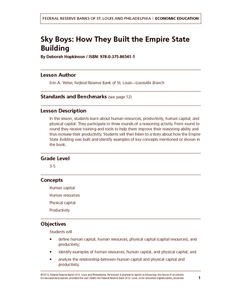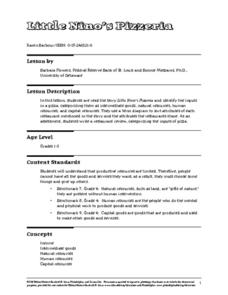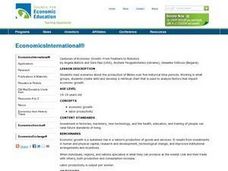Federal Reserve Bank
Investing in Yourself: An Economic Approach to Education Decisions
What is the difference between physical capital and human capital, and in which should you invest? While considering the concept of return on investment, take a look at the payoffs and consequences of investing in training and education.
Federal Reserve Bank
Ben Franklin: Highlighting the Printer
By studying Benjamin Franklin's work as a printer, your class will have a fantastic opportunity to learn about the economic concepts of entrepreneurship, human capital, and investment.
Federal Reserve Bank
What Are the ‘Ingredients’ for Economic Growth?
Delve into the concept of economic growth with your class members, including why economic growth is important, what causes it, and how can countries encourage it.
Carolina K-12
Factors of Production and Economic Decision-Making
Class members begin this engaging economics activity by listing all the resources used in producing a car and using that example to draw parallels to the four primary factors of production: capital goods, labor, natural resources, and...
Federal Reserve Bank
Ten Mile Day
Get your class working on the railroad with this detailed and interactive lesson. After reading and discussing Ten Mile Day, learners explore division of labor, human capital, and productivity with a hands-on group activity in which they...
Federal Reserve Bank
Sky Boys: How They Built the Empire State Building
How tall is the Empire State Building? Lead your class through a collaborative estimation activity to determine the number of quarters it would take to reach the top and teach the following concepts: human capital, human resources,...
Federal Reserve Bank
Lesson 4: Back to School
Based on your current level of human capital, how long would it take you to earn $1,000,000? What about your potential human capital? Learners explore the importance of education and experience when entering the workforce, and compare...
Federal Reserve Bank
Journey to Jo’burg: A South African Story
How did South African apartheid affect the ability of people of color to increase their human capital? Here is a rich lesson in which learners come to understand the relationship between investment in human capital and income, while also...
Carolina K-12
Practice Test of Economics
From scarcity and supply and demand to entrepreneurship and the stock market, here you'll find a multiple-choice assessment that includes 34 questions covering all the major concepts of a traditional economics course.
Winston-Salem Forsych County Schools
Economics Worksheet Economic Systems and Circular Flow
Agribusiness, human capital, productivity. Find out what your class members know about economic systems and terminology with this two-page economics instructional activity that that asks kids to identify terms and concepts.
Federal Reserve Bank
Arts and Economics Infographic Questionnaire
How do careers in the arts contribute to America's gross domestic product? Use an informative infographic that details the economic details of careers in the core arts, including design services, performing arts, and arts education, to...
Curated OER
Earning an Income
Fourth graders study the role of money in society and define how to earn an income. In this human capital lesson, 4th graders read the book Shoeshine Girl and discuss it. Students discuss various economic concepts and complete the...
Curated OER
Chapter 17: Economic Growth and the New Economy
Is economic growth necessary to remain a relevant world power? These slides discuss the definition and implications of growth economics, complete with global comparisons and ways to account for growth. Graphs and charts are easy to read...
Carolina K-12
Comparing Economic Systems
How do people make decisions in a world where wants are unlimited but resources are not? How do individuals and governments utilize scarce resources (human, natural, and capital) in different economic systems? Introduce your learners to...
Council for Economic Education
The Economics of Income: If You’re So Smart, Why Aren't You Rich?
If basketball players make more than teachers, why shouldn't learners all aspire to play in the NBA? Unraveling the cost and benefits of education and future economic success can be tricky. Economic data, real-life cases, and some...
Council for Economic Education
Athens and Sparta-Imagine the Possibilities
Both Athens and Sparta made choices to survive in ancient Greece. Those choices were, in essence, economic ones about how to direct resources. A Venn diagram activity and reading ask class members to examine the connection between...
Curated OER
An Introduction to Modern Economics
Practice reading comprehension with this informational economics worksheet. Learners read a 2-page explanation of the beginnings of modern economics and how it plays a role in society. This reading discusses natural, human and capital...
Center for Entrepreneurship and Economic Education
Popcorn Economics
Scarcity of resources is a fundamental economics concepts that kids need to understand. You'll use a large bag of popcorn to demonstrate this concept. Have the class come up row-by-row to fill their snack bags with popcorn. By the last...
Council for Economic Education
Teaching Economics Using Children's Literature
Introduce young learners to the subject of economics using their favorite stories and books. Including 24 separate lessons, this guide covers economic principles such as trade, scarcity, consumer goods and services, renewable and...
Federal Reserve Bank
Little Nino's Pizzeria
Engage your youngsters in basic economics by connecting the terms to dessert and pizza! After a discussion about intermediate goods and natural resources, learners read and connect a pizzeria to economic terms.
Curated OER
Lemonade For Sale
2-3rd graders listen to the story, Lemonade for Sale, by Stuart J. Murphy. In the story, children produce and sell lemonade to raise money for their clubhouse, create a product, classify the resources used in production as natural...
Curated OER
Centuries of Economic Growth: From Feathers to Robotics
Students read scenarios about the production of Bibles over five historical time periods. Working in small groups, students create skits and develop a retrieval chart that is used to analyze factors that impact economic growth.
Curated OER
Three Little Pigs: Human, Natural and Capital Resources
First and second graders will learn about natural, capital , and human resources through the story The Three Little Pigs. They will listen to the story, write down what they know about straw, wood, and brick, then complete a chart...
Federal Reserve Bank
Financial Literacy Infographic Scavenger Hunt
A lesson in personal finance can be the most valuable part of a high school education. Connect the basics of banking with informational reading skills in a lesson that prompts teenagers to answer a series of questions based on an array...

























